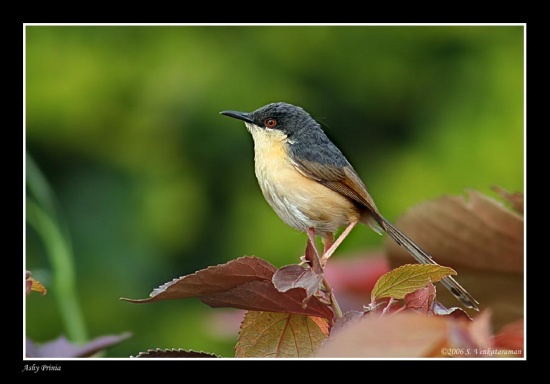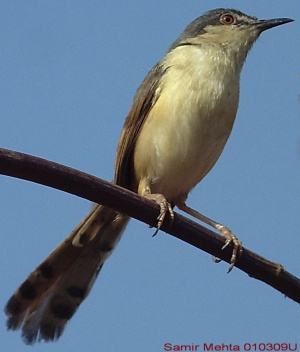(User template. References given for copied text) |
Aloktewari (talk | contribs) (copyright audio files 1 & 2) |
||
| (16 intermediate revisions by 4 users not shown) | |||
| Line 1: | Line 1: | ||
| − | [[Image:Ashy_Prinia.jpg|thumb|550px|right|Photo by {{user|svenky1962|svenky1962}} <br/> | + | [[Image:Ashy_Prinia.jpg|thumb|550px|right|Nominate subspecies<br />Photo © by {{user|svenky1962|svenky1962}} <br />Hebbal, Bangalore, [[India]], Jul 2006]] |
;[[:Category:Prinia|Prinia]] socialis | ;[[:Category:Prinia|Prinia]] socialis | ||
| − | |||
==Identification== | ==Identification== | ||
| − | 13-14 cm | + | [[Image:ashy_prinia_alok_1.JPG|thumb|350px|right|Subspecies ''P. s. stewarti'', breeding plumage<br />Photo © by {{user|aloktewari|Alok Tewari}} <br />[[Keoladeo National Park]], Bharatpur, [[India]], July-2016]] |
| − | + | 13-14 cm | |
| + | *Ash grey above | ||
| + | *Black eye stripe | ||
| + | *White underparts | ||
| + | *Yellow flanks | ||
| + | *Short rounded wings | ||
| + | *Long tail - in non-breeding plumage; tail is significantly shorter in breeding plumage. | ||
| + | *Strong legs | ||
| + | *Short black bill<br /> | ||
| + | Sexes identical. '''Male''' develops a blacker bill and mouth in the breeding season; | ||
==Distribution== | ==Distribution== | ||
| − | [[India]] | + | [[Asia]]: found in [[Nepal]], [[Pakistan]], [[India]], Eastern and Western [[Himalayas]], [[Sri Lanka]], [[Bangladesh]] |
| − | |||
==Taxonomy== | ==Taxonomy== | ||
| − | There are 4 subspecies | + | ====Subspecies==== |
| − | * ''P s | + | There are 4 subspecies<sup>[[#References|[1]]]</sup>: |
| − | * ''P s | + | *''P. s. stewarti'': |
| − | * ''P s | + | :*Northern [[Pakistan]] (upper Indus River) to [[Nepal]] and northern [[India]] |
| − | * ''P s brevicauda'' | + | *''P. s. inglisi'': |
| − | + | :*North-eastern [[India]] to Sikkim, Bhutan, Assam and [[Bangladesh]] | |
| + | *''P. s. socialis'': | ||
| + | :*Peninsular [[India]] | ||
| + | *''P. s. brevicauda'': | ||
| + | :*[[Sri Lanka]] | ||
| + | [[Image:Prinia Ashy non breeding IMG 0680web.jpg|thumb|300px|right|Nominate subspecies, non-breeding plumage<br />Photo © by {{user|mehtasa|mehtasa}}<br />Near Uran, Maharashtra,[[ India]], March 2009]] | ||
==Habitat== | ==Habitat== | ||
| − | + | Wetlands, scrub, grasslands and gardens up to 400 feet | |
| − | |||
==Behaviour== | ==Behaviour== | ||
| + | ====Diet==== | ||
The diet includes insects. | The diet includes insects. | ||
| + | ====Breeding==== | ||
| + | The nest is formed from leaves stitched together with webs and hair, it's placed close to the ground in a shrub or tall grass. Three to five pointed oval very glossy, chestnut or red eggs are laid. Both parents share incubation and feeding the young. | ||
| + | ====Vocalisation==== | ||
| + | The song is a repetitive ''tchup, tchup, tchup'' or ''zeet-zeet-zeet''. | ||
| − | + | {{Audio|ashy_prinia_alok.mp3}} | |
| − | + | Recording © by {{user|aloktewari|Alok Tewari}}<br /> | |
| − | + | Sultanpur Village, Dist. Gurgaon, Haryana, [[India]], Aug.-2016<br /> | |
| + | Call given just before Sunset, in farmland and adjacent wilderness and Tamarisk scrub.<br /> | ||
| + | |||
| + | {{ Audio|Ashy_Prinia_2_Alok.mp3 }}<br /> | ||
| + | Recording © by {{user|aloktewari|Alok Tewari}}<br /> | ||
| + | Village Budhera, Gurugram, Haryana, [[India]], 20 June 2023<br /> | ||
| + | Call given just before Sunset, in farmland and adjacent wilderness and Tamarisk scrub. | ||
==References== | ==References== | ||
| − | # | + | #{{Ref-Clements6thAug11}}#Avibase |
| + | #Wikipedia | ||
| + | {{ref}} | ||
| + | ==External Links== | ||
| + | {{GSearch|"Prinia socialis" {{!}} "Ashy Prinia"}} | ||
| + | <br /> | ||
| + | {{VSearch|"Prinia socialis" {{!}} "Ashy Prinia", video}} | ||
| − | + | {{GS-checked}}1 | |
| − | {{ | + | <br /> |
| − | [[Category:Birds]][[Category:Prinia]] | + | <br /> |
| + | |||
| + | [[Category:Birds]][[Category:Prinia]][[Category:Bird Songs]][[Category:Videos]] | ||
Latest revision as of 16:22, 11 July 2023
- Prinia socialis
Identification

Photo © by Alok Tewari
Keoladeo National Park, Bharatpur, India, July-2016
13-14 cm
- Ash grey above
- Black eye stripe
- White underparts
- Yellow flanks
- Short rounded wings
- Long tail - in non-breeding plumage; tail is significantly shorter in breeding plumage.
- Strong legs
- Short black bill
Sexes identical. Male develops a blacker bill and mouth in the breeding season;
Distribution
Asia: found in Nepal, Pakistan, India, Eastern and Western Himalayas, Sri Lanka, Bangladesh
Taxonomy
Subspecies
There are 4 subspecies[1]:
- P. s. stewarti:
- P. s. inglisi:
- North-eastern India to Sikkim, Bhutan, Assam and Bangladesh
- P. s. socialis:
- Peninsular India
- P. s. brevicauda:
Habitat
Wetlands, scrub, grasslands and gardens up to 400 feet
Behaviour
Diet
The diet includes insects.
Breeding
The nest is formed from leaves stitched together with webs and hair, it's placed close to the ground in a shrub or tall grass. Three to five pointed oval very glossy, chestnut or red eggs are laid. Both parents share incubation and feeding the young.
Vocalisation
The song is a repetitive tchup, tchup, tchup or zeet-zeet-zeet.
Recording © by Alok Tewari
Sultanpur Village, Dist. Gurgaon, Haryana, India, Aug.-2016
Call given just before Sunset, in farmland and adjacent wilderness and Tamarisk scrub.
Recording © by Alok Tewari
Village Budhera, Gurugram, Haryana, India, 20 June 2023
Call given just before Sunset, in farmland and adjacent wilderness and Tamarisk scrub.
References
- Clements, JF. 2011. The Clements Checklist of Birds of the World. 6th ed., with updates to August 2011. Ithaca: Cornell Univ. Press. ISBN 978-0801445019. Spreadsheet available at http://www.birds.cornell.edu/clementschecklist/downloadable-clements-checklist
- Avibase
- Wikipedia
Recommended Citation
- BirdForum Opus contributors. (2024) Ashy Prinia. In: BirdForum, the forum for wild birds and birding. Retrieved 9 May 2024 from https://www.birdforum.net/opus/Ashy_Prinia
External Links
GSearch checked for 2020 platform.1





